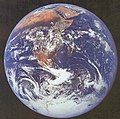Difference between revisions of "Chem321:Discussion 4"
(→Limitations) |
(→Wonder tech) |
||
| Line 13: | Line 13: | ||
==Wonder tech== | ==Wonder tech== | ||
'''If you had $50 billion to spend on developing some new technology, what would you choose, and how would you spend the money?''' | '''If you had $50 billion to spend on developing some new technology, what would you choose, and how would you spend the money?''' | ||
| + | *If I had $50 billion to spend on developing new technology, I'd develop a way to harness hydrogen as a fuel source for vehicles. I'd create the infrastructure needed in order to make it available to the public (equivalent of gas stations), I'd create a safer way to ensure that vehicles don't blow up upon crash, and I'd fund the research needed to make electrolysis more efficient (cost-wise and waste-wise). By making hydrogen powered cars available to the public, we'd cut our emissions greatly with a renewable resource. However, this would be a very costly project, hence the reason I'd put all of my money towards this verses another energy source.[[User:HKopelson|HKopelson]] ([[User talk:HKopelson|talk]]) 10:38, 16 July 2012 (EDT) | ||
Revision as of 10:38, 16 July 2012
WORLD (Chemistry 321) |
| MAIN PAGE |
|---|
| Syllabus — Schedule |
| Welcome page Contact Dr. Walker |
| This week |
| Today's tasks — (tomorrow) |
| Course units 1 - 2 - 3 - 4 - 5 - 6 - 7 8 - 9 - 10 - 11 - 12 - 13 - 14 |
| Moodle site |
|
|
| Course content |
| Assignments Paper - Acme - 1 - 2 - 3 - 4 - 5 |
| Practice problems |
| Discussions |
|
|
| General wiki help |
| Basic editing Create an account Protocols Tutorial Demo, for practice |
This discussion is based on discussing two questions, and it is set to take place on the wiki, over the next few days (until midnight on Monday, 16th July). We will leave comments on the page below, in response to (and under) the questions posted or the related responses. Be sure to start your text with a *, and sign your responses with four tilde marks at the end.
Laws of conservation of matter and energy
Classical laws of chemistry and thermodynamics tell us that neither mass and energy cannot be destroyed; both are conserved during any physical or chemical process. (Strictly speaking we should use a combination of mass-energy when talking about nuclear reactions, but these are rare on Earth.) What can we learn from the conservation of mass and conservation of energy when considering global resources of mass and energy?
- These sources may be finite, but their energy is not. Although it loses its sense of exergy once it's been used up (like gasoline), that new heat energy impacts other environments and systems and causes changes to occur. This can be applied to many different forms of energy that we use daily- if we use less of these resources, than less heat will be transferred to neighboring environments later on. By reducing our inputs, we reduce our outputs of waste and damage. HKopelson (talk) 10:29, 16 July 2012 (EDT)
Limitations
Science is clearly valuable when studying the environment. What do you perceive as the limitations of science in this context?
- Science helps us understand how systems work, especially ecosystems. By studying all of the relationships between living and non-living factors (ecology) that go into and out of an ecosystem, we can understand what's impacting that ecosystem negatively, what's key to making it thrive, what inhibits certain functions, among many other important aspects. However, just understanding these concepts doesn't solve any of the problems that we, or other entities, cause though. Science is used to develop technology to aid in eliminating these harmful problems. Science also can give us ideas of how to make these processes more efficient and less wasteful. But, science is only really a thought process; not a solution. It can be used in creatinga solution, but isn't one itself.HKopelson (talk) 10:33, 16 July 2012 (EDT)
Wonder tech
If you had $50 billion to spend on developing some new technology, what would you choose, and how would you spend the money?
- If I had $50 billion to spend on developing new technology, I'd develop a way to harness hydrogen as a fuel source for vehicles. I'd create the infrastructure needed in order to make it available to the public (equivalent of gas stations), I'd create a safer way to ensure that vehicles don't blow up upon crash, and I'd fund the research needed to make electrolysis more efficient (cost-wise and waste-wise). By making hydrogen powered cars available to the public, we'd cut our emissions greatly with a renewable resource. However, this would be a very costly project, hence the reason I'd put all of my money towards this verses another energy source.HKopelson (talk) 10:38, 16 July 2012 (EDT)
